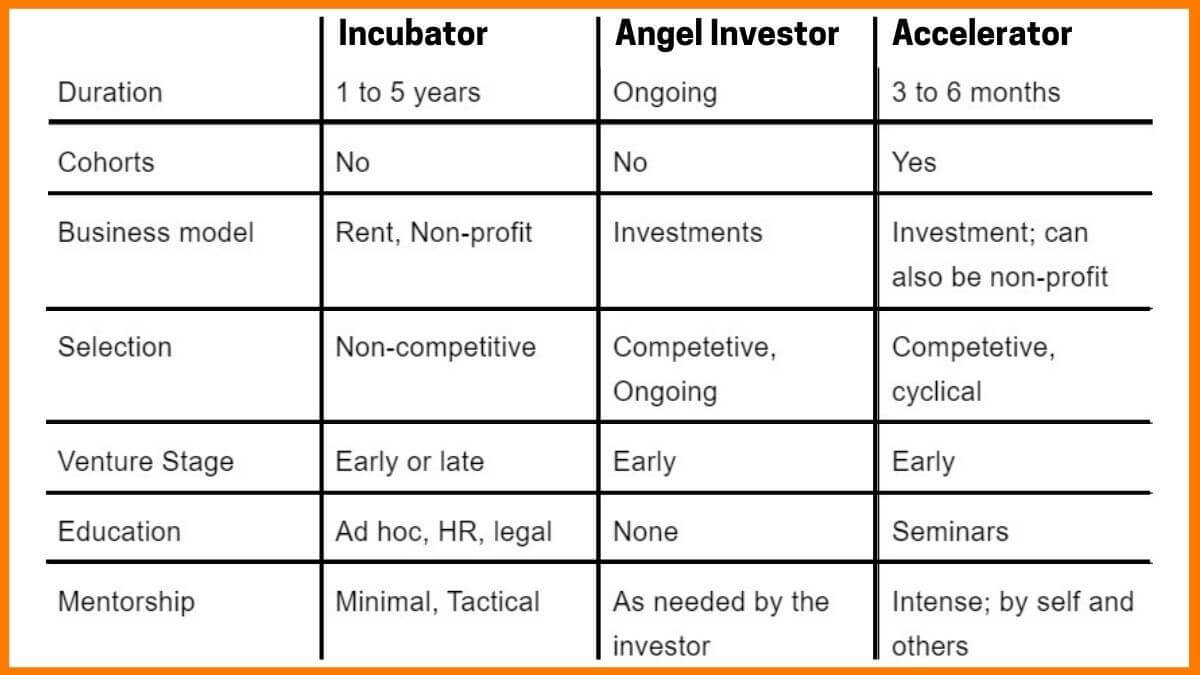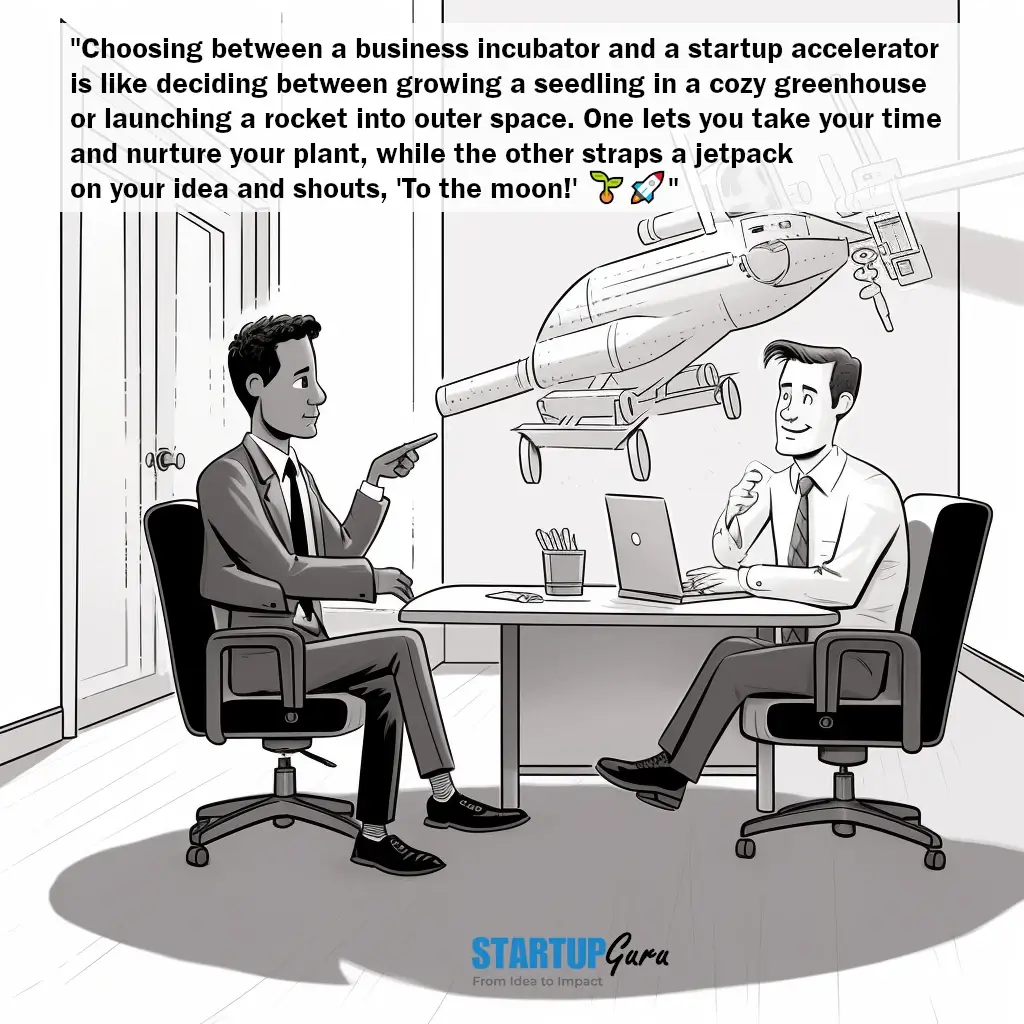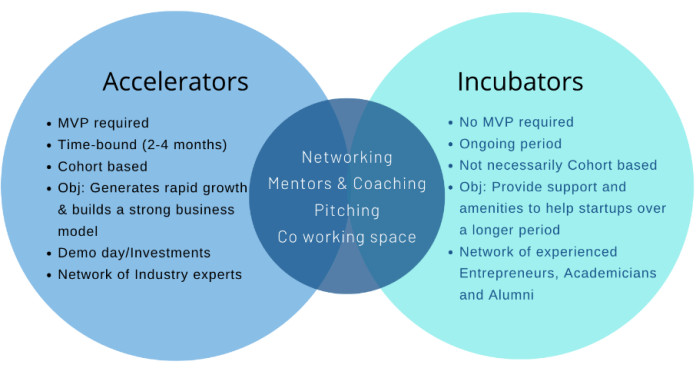Startup Incubator vs Accelerator. So, you’re exploring the world of startup support, and you’ve probably come across terms like “startup business incubator” and “startup accelerator”. You might be wondering, what’s the difference between the two? Well, let me break it down for you in plain and simple language!
In this post, we'll cover:
How does a startup incubator differ from an accelerator?

The terms “startup incubator” and “accelerator” are often used interchangeably, but they serve distinct purposes and offer different types of support to early-stage startups.
Incubators and Startup Accelerators aren’t the same. Incubators incubate very-early stage startups by helping them convert their ideas into viable businesses. Accelerators, on the other hand, accelerate already running businesses that have got some market validations.
Think of a business incubator as a nurturing home for baby startups. It’s like a safe cocoon where early-stage ventures get all the care and support they need to grow and develop.
Incubators typically provide resources like office space, mentorship, workshops, and access to a network of experienced entrepreneurs and investors.
They focus on helping startups refine their business models, validate their ideas, and get ready for the big, competitive world out there. Incubators usually work with startups for a more extended period, giving them time to strengthen their roots and build a solid foundation.
On the other hand, a startup accelerator is like a turbo boost for already fledgling startups.
Picture a fast-paced boot camp designed to catapult startups to the next level. Accelerators typically run short-term, intensive programs that last a few months. During this time, startups receive mentorship, guidance, and often some funding in exchange for equity.
The focus here is on rapid growth, market validation, and scaling the business. Accelerators help startups fine-tune their strategies, connect with potential customers, and secure investments, all in a compressed timeframe.
Key differences between a Startup Incubator and Accelerator

Startup Incubator
Focus: Incubators focus on nurturing and supporting early-stage startups right from the idea or concept stage. They aim to help entrepreneurs develop a viable business model and build a strong foundation for their startup.
Stage of Startups: Incubators typically work with very early-stage startups, often at the pre-seed or idea-validation stage of startup. They accept startups with a wide range of business ideas and concepts.
Duration: Incubator programs are usually longer-term, lasting from a few months to a year or more. The duration allows startups to take the time needed to refine their business model and product.
Support: Incubators provide a supportive and collaborative environment. They offer resources such as office space, infrastructure, mentoring, workshops, and networking opportunities.
Equity and Funding: Incubators may or may not take equity in the startups they support. Funding opportunities in incubators are less common, and if they do provide funding, it’s usually at a smaller scale compared to accelerators.
Startup Accelerator
Focus: Accelerators are designed to accelerate the growth and scaling of startups that have already developed a viable business model and product. They aim to help startups grow rapidly and achieve significant milestones.
Stage of Startups: Startup Accelerators usually work with startups that have already demonstrated some market traction, have a minimum viable product (MVP), and are ready to scale.
Duration: Accelerator programs are short and intensive, typically lasting for a few months, during which startups undergo an intense and focused program to achieve specific goals.
Support: Accelerators provide intense mentoring, business development, and access to a network of investors, venture capital firms, mentors, and potential partners. The focus is on rapidly growing the business.
Equity and Funding: Accelerators often take equity in the startups they support, usually in exchange for funding, mentorship, and access to their network. They offer a higher level of funding compared to incubators.
How to choose the right one – incubator or accelerator?
Choosing between a startup incubator and an accelerator depends on various factors and your startup’s specific needs and goals. Here are some key considerations to help you make the right decision:
Stage of Your Startup
Consider the stage of your startup’s development. If you are at an early stage and need time to refine your idea, business model, and product, an incubator might be the better fit. On the other hand, if you already have a viable product and are looking to scale rapidly, an accelerator can provide the necessary boost.
Time Commitment
Incubator programs typically run for a more extended period, often several months to a year. If you prefer a more relaxed pace and need time to experiment and iterate, an incubator might be a better match. Accelerator programs, on the other hand, are usually intensive and last a few months, demanding a significant time commitment.
Funding Needs
Consider your funding requirements. Accelerators often provide startups with funding in exchange for equity. If you need immediate funding to fuel growth, an accelerator can be an attractive option. Incubators may offer resources, mentorship, and connections, but they might not provide direct funding.
Mentorship and Support
Evaluate the mentorship and support offered by both options. Incubators typically offer more extensive mentorship and guidance, catering to startups at different stages. Accelerators also provide mentorship, but the focus is often on rapid growth and market validation.
Networking Opportunities
Consider the networking opportunities each program provides. Both incubators and accelerators offer access to a network of experts, investors, and fellow entrepreneurs. Assess which program’s network aligns with your startup’s industry and target market.
Industry Focus
Take into account the industry focus of the program. Some incubators and accelerators specialize in specific sectors like technology, healthcare, cleantech, or fintech. Choose the program that aligns with your startup’s industry and target market.
Goals and Growth Trajectory
Be clear about your startup’s goals and growth trajectory. If you aim to grow steadily and have more time to develop your business, an incubator might suit you. If rapid growth and scaling are your primary objectives, an accelerator might be the right choice.
Program Reputation and Success Stories
Research the reputation of the incubator or accelerator and look into the success stories of previous startups they have supported. The track record of the program and its alumni can give you valuable insights into its effectiveness.
Location
Consider the location of the program. Being part of an ecosystem with access to potential customers, investors, and resources can be advantageous for your startup.
Cost and Equity
Understand the costs involved and whether the program requires equity in your startup. Some programs may be fee-based, while others may take equity in exchange for their support.
Ultimately, the right choice depends on your startup’s unique needs, goals, and growth trajectory. Take the time to research and evaluate various incubators and accelerators, and consider reaching out to alumni or participants for their insights. Whichever path you choose, remember that both incubators and accelerators can be instrumental in guiding your startup towards success and growth.
Top Startup Incubators and Accelerators
In the fast-paced world of entrepreneurship, startup incubators and accelerators have emerged as vital players in the success stories of innovative ventures. These specialized programs provide early-stage startups with the support, resources, and mentorship needed to thrive and scale in the competitive business landscape. Let’s explore some of the top startup incubators and accelerators, each with its unique approach and offerings.
Y Combinator (Accelerator)
Y Combinator needs no introduction. This iconic Silicon Valley accelerator has nurtured some of the biggest names in the tech industry, including Airbnb, Dropbox, and Reddit. Known for its intense three-month program, Y Combinator offers startups funding, mentorship, and access to a powerful network of investors and successful entrepreneurs. With Demo Day, a grand finale where startups pitch to potential investors, Y Combinator gives wings to groundbreaking ideas.
500 Startups (Accelerator)
500 Startups takes a global approach to supporting early-stage startups. With a presence in more than 70 countries, this accelerator offers a four-month program that provides funding, mentorship, and access to a vast network of mentors and investors. Known for its “Kanban-style” program structure, 500 Startups helps startups navigate their unique challenges and accelerate their growth.
Techstars (Accelerator)
Techstars is another prominent accelerator program with a wide range of industry-specific programs tailored to different sectors, from healthcare to fintech and more. Startups selected for Techstars benefit from hands-on mentorship, funding, and access to an extensive network of alumni and industry experts. The program concludes with a Demo Day, where startups pitch to potential investors and partners.
Idealab (Incubator)
Idealab, founded by the visionary Bill Gross, is an iconic startup incubator that has been fostering innovation since 1996. Unlike accelerators, Idealab provides a more extended nurturing period, allowing startups to explore and refine their ideas. With a focus on technology-driven ventures, Idealab offers mentorship, resources, and access to a vast network, helping startups develop their ideas into successful businesses.
Seedcamp (Accelerator)
Seedcamp is a leading European accelerator that supports startups at various stages. With a six-month program, Seedcamp offers early-stage companies mentorship, funding, and access to a global network of investors and experts. What sets Seedcamp apart is its emphasis on community building, enabling startups to connect, collaborate, and learn from each other.
Station F (Incubator)
Station F, based in Paris, is the world’s largest startup campus and incubator. It provides startups with an inspiring co-working space, resources, and a vibrant community of like-minded entrepreneurs. With a focus on diversity and inclusion, Station F supports startups from various industries and backgrounds, creating a dynamic ecosystem for innovation to flourish.
Entrepreneurs First (Incubator)
Entrepreneurs First takes a unique approach to incubation by investing in individuals with deep technical expertise or domain knowledge and helping them form co-founder teams. With intense mentorship, funding, and a focus on building high-growth technology startups, Entrepreneurs First unlocks the full potential of groundbreaking ideas.
StartupGuru (Incubator)
StartupGuru is a leading startup incubator that is fully remote and focuses on non-technical and underrepresented founders who are building tech startups. The incubator provides handholding support on idea stage validation, building the MSP (Minimum Sellable Product), user acquisition and funding.
Brinc (Accelerator)
Brinc specializes in hardware and IoT startups, providing them with mentorship, funding, and access to a global network of industry experts. With a focus on product development and manufacturing, Brinc empowers hardware startups to bring their ideas to life and scale effectively.
LACI (Incubator)
LACI, the Los Angeles Cleantech Incubator, focuses on supporting startups in the clean and sustainable technology sector. With a mission to create a more sustainable future, LACI offers mentorship, resources, and access to a network of experts and investors, providing startups with the tools to make a positive impact on the environment.
Nex-Labs Agora (Incubator)
Nex-Labs Agora is a semantic search engine and social hub catering to Mediterranean institutions, startups, SMEs, and researchers interested in clean ICT technologies for sustainable agri-food production. With a focus on efficient energy and water use, this incubator offers training, advice, and business model prototyping to drive innovation in the Mediterranean region.
For more details, check out our comprehensive lists of the world’s top startup accelerators and business incubators.
TL;DR
Startup Incubator v/s Accelerator
While both startup incubators and accelerators aim to support early-stage startups, incubators focus on idea validation and foundational support over a more extended period, while accelerators are geared towards rapid growth and scaling over a shorter, intensive program.
The choice between an incubator and an accelerator depends on the specific needs and stage of development of the startup.
So, in a nutshell, startup incubators provide a nurturing environment for early-stage startups to grow steadily, while startup accelerators offer a fast-paced launchpad for startups already on their way to take flight in the market. Both play a vital role in supporting the entrepreneurial ecosystem, catering to different stages of the startup journey.
Startup incubators and accelerators play pivotal roles in shaping the success of innovative ventures. Each of these top programs offers a distinct set of resources and support, tailored to cater to startups’ unique needs and aspirations. Whether it’s the nurturing environment of incubators or the turbo-boost of accelerators, these programs fuel the growth of startups and foster a thriving entrepreneurial ecosystem worldwide.
Now that you know the difference, you can better choose the path that aligns with your startup’s needs and aspirations! Happy innovating!


